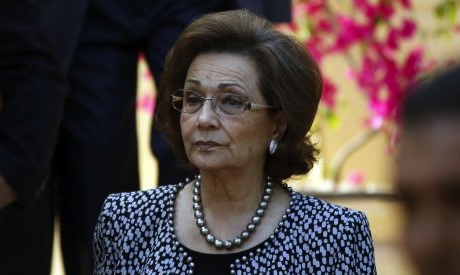
Egypt's First Lady, Suzanne Mubarak, attends the Stop Human Trafficking Now forum in Luxor, southern Egypt December 11, 2010. REUTERS/ Goran Tomasevic
On 10 December, Mrs Suzanne Mubarak, chairperson of the Suzanne Mubarak Women's International Peace Movement (SMWIPM), announced during a conference held in Luxor a new plan to address human trafficking.
The plan has four main cores, dubbed the four Ps: prevention, protection, participation and prosecution. The plan will be implemented starting January 2011 and run for two years. In 2013 the plan will be evaluated to identify its strong and weak points.
Mrs Mubarak pointed out that although there is a clear definition of human trafficking, the lines are often blurred between child labour, migrant labour, exploitative labour, and illegal labour and trafficking. It can be easy to lose sight of the main issue at hand.
Some 16 ministries will be involved in the new plan, along with specialised committees affiliated to the National Committee to Combat Human Trafficking (NCCHT). “The [NCCHT] studied for one year and a half laws for combating human trafficking in more than 60 countries, drafting a comprehensive law to combat this crime. This law was passed by the People's Assembly in April this year,” said Mrs Mubarak.
Mrs Mubarak said that the international conference in Luxor, entitled “End Human Trafficking Now: Enforcing the UN Protocol,” would become a milestone in international efforts to combat the crime, 10 years after the Palermo Protocol to Prevent, Suppress and Punish Trafficking in Persons.
Strengthening the global movement against human trafficking was the main goal of the Luxor conference, at which was underlined the centrality of the role of youth in the fight against trafficking. After announcing the two-year plan, Mrs Mubarak met with youth from 39 countries at the Steigenberger Nile Palace Hotel, hearing their personal experiences in combating trafficking.
“Our youth network members have really spread their wings in the last couple years. Some are working hard through our Culture of Peace Programme to raise awareness about the issue of human trafficking in schools, universities and community centres; others are mobilising action through media campaigns and the use of information and communication technology (ICT) tools,” said Mrs Mubarak.
In parallel to efforts to end human trafficking, Mrs Mubarak said the SMWIPM launched a Cyber Peace Initiative (CPI) in September 2007 as a means of developing the capacity of young leaders to tap into the power of ICT to enhance peace and tolerance. “In this respect, CPI works to mobilise young people to work alongside parents and educators to promote a culture of safety on the internet,” she said.
The Egyptian FIrst Lady added: “it is by working with young people that I have come to realise how vital their role is in the peace and security process, how they can positively impact their communities in so many different ways.”
The Luxor conference was attended by Ismail Khairat, head of Egypt's State Information Service, Ismail Serrageddin, director of the Bibliotheca Alexandrina, Minister of State for Family and Population Moushira Khattab, and representatives of UN and the Global Initiative to Fight Human Trafficking (GIFAT).
Short link: